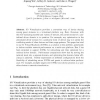Free Online Productivity Tools
i2Speak
i2Symbol
i2OCR
iTex2Img
iWeb2Print
iWeb2Shot
i2Type
iPdf2Split
iPdf2Merge
i2Bopomofo
i2Arabic
i2Style
i2Image
i2PDF
iLatex2Rtf
Sci2ools
106
click to vote
HPCC
2007
Springer
2007
Springer
Towards Scalable and High Performance I/O Virtualization - A Case Study
I/O Virtualization provides a convenient way of device sharing among guest domains in a virtualized platform (e.g. Xen). However, with the ever-increasing number and variety of devices, the current model of a centralized driver domain is in question. For example, any optimization in the centralized driver domain for a particular kind of device may not satisfy the conflicting needs of other devices and their usage patterns. This paper has tried to use IO Virtual Machines (IOVMs) as a solution to this problem, specifically to deliver scalable network performance on a multi-core platform. Xen 3 has been extended to support IOVMs for networking and then optimized for a minimal driver domain. Performance comparisons show that by moving the network stack into a separate domain, and optimizing that domain, better efficiency is achieved. Further experiments on different configurations show the flexibility of scheduling across IOVMs and guests to achieve better performance. For example, multipl...
Centralized Driver Domain | Distributed And Parallel Computing | Driver Domain | HPCC 2007 | Minimal Driver Domain |
Related Content
| Added | 07 Jun 2010 |
| Updated | 07 Jun 2010 |
| Type | Conference |
| Year | 2007 |
| Where | HPCC |
| Authors | Jinpeng Wei, Jeffrey R. Jackson, John A. Wiegert |
Comments (0)

